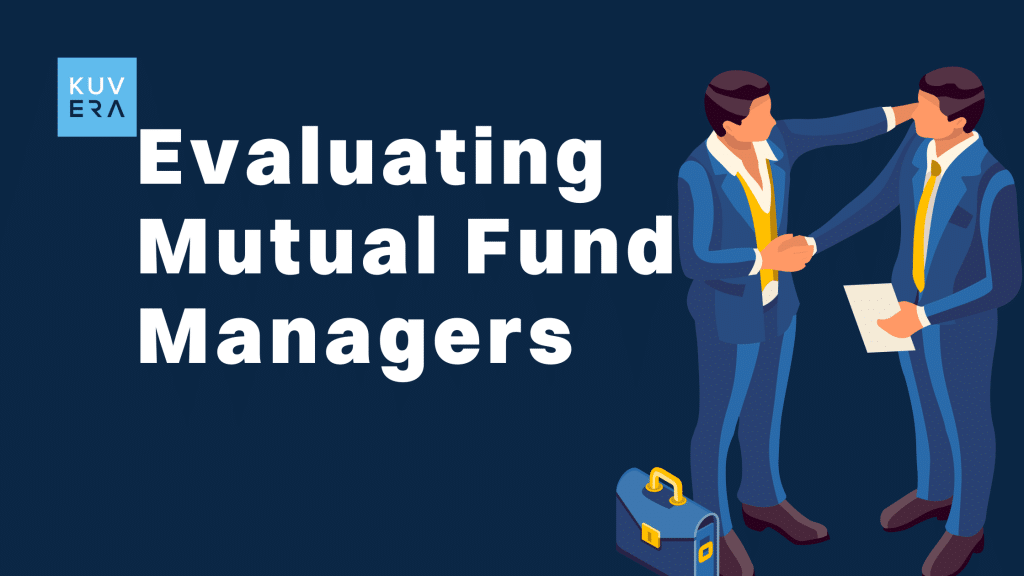Financial goal planning with mutual fund schemes is a recipe of well-matched, fund, scheme, TER (Total Expense Ratio), performance ratios, risk profile and fund manager qualification of a mutual fund.
Do you wish to grow your wealth? Investing in mutual funds in India can be a smart way to grow your wealth. But with so many options available, how do you choose the right fund for you? One crucial factor to consider is the mutual fund manager.
The mutual fund manager is responsible for making investment decisions for the fund. Their skill and experience can significantly impact mutual fund returns. Therefore, it is essential to evaluate the fund manager before investing your hard-earned money. But how do you evaluate fund managers of various mutual fund schemes?
What to look for when evaluating mutual funds managers?
Here are ten points you can look for when evaluating mutual fund managers:
1. Fund Manager Experience
You can first shortlist a fund that matches your financial goals. Next, you can shortlist mutual fund schemes and then compare fund managers. One of the better ways to compare is to look for a fund manager with a solid track record and considerable experience managing mutual funds in India. An experienced manager will have navigated various market cycles and have a deeper understanding of investment strategies. For example, a manager with over ten years of experience managing equity funds would be preferable to someone who recently started their career.
2. Investment Philosophy
It is not just their education, but their philosophy while investing that can impact your finances. Every fund manager has an investment philosophy that guides their decision-making. Some managers may be growth-oriented, while others may be value-oriented. Ensure the manager’s philosophy aligns with your investment goals and risk tolerance. For instance, if you’re a conservative investor, you might prefer a manager who follows a value investing approach.
3. Risk Management
So, you got fund managers shortlisted based on their investment philosophy. What should come next?
Next, you can look at ‘risk’.
How does the manager approach risk? Do they prioritise capital preservation or pursue high returns at higher risk? Understanding their risk management strategy is crucial, especially when investing in volatile markets like India. Look for managers who have a clear risk management framework and have demonstrated their ability to manage downside risk during market downturns.
4. Fund Performance
While past performance is not indicative of future results, it is still an essential factor to consider. You can analyse the fund’s performance over different periods, such as 3, 5, and 10 years, and compare it to the benchmark and other similar funds. It can help to look for consistency in mutual fund returns across different market cycles. For example, if a fund has consistently outperformed its benchmark over the long term, it indicates the manager’s ability to generate alpha.
5. Expense Ratio
The expense ratio is the annual fee charged by the fund to manage your investments. Higher expense ratios can eat into your mutual fund returns. You can compare the expense ratio of the fund to other similar funds and choose a fund with a reasonable expense ratio.
6. Portfolio Turnover
Portfolio turnover is the rate at which the fund manager buys and sells securities within the fund. High portfolio turnover can result in higher transaction costs, which can impact your mutual fund return. It can be better to look for funds with a lower portfolio turnover, indicating that the manager follows a buy-and-hold strategy.
7. Investment Style
Does the manager follow a top-down or bottom-up approach? Do they focus on large-cap, mid-cap, or small-cap stocks? Understanding the manager’s investment style can help you determine if it aligns with your investment preferences. You need to remember that the fund manager’s investment style directly aligns with your selected scheme’s risk profile.
8. Communication
How effectively does the fund manager communicate with investors? You can look for managers who provide regular updates on the fund’s performance and their investment strategy. Clear and transparent communication can help you stay informed and make better investment decisions.
9. Team Stability
A stable and experienced investment team can contribute to consistent mutual fund returns. Frequent changes in the fund management team can disrupt the investment strategy and impact the fund’s performance. However, this can be difficult to know, analyse and track.
10. Alignment of Interests
You can ensure the fund manager’s interests are aligned with yours. Do they have a significant investment in the fund they manage? This “skin in the game” can incentivize the manager to perform well and prioritise investors’ interests.
By considering these ten points, you can evaluate mutual fund managers and make informed investment decisions. You need to remember, investing in mutual funds India involves risks, and past performance is not a guarantee of future results. However, by choosing a skilled and experienced fund manager, you can increase your chances of achieving your financial goals.
Look for different mutual fund types and match with your financial goals using the Kuvera portal.
Wrapping Up
Evaluating mutual fund managers requires careful consideration of various factors beyond just mutual fund returns. By analysing their experience, investment philosophy, risk management strategies, and communication style, you can gain valuable insights into their capabilities. You should always consider looking for consistency in performance, reasonable expense ratios, and alignment of interests to ensure your investment is in good hands.
Ultimately, choosing the right mutual fund India depends on your individual financial goals and risk tolerance. Take the time to research and compare different funds and their managers before making an investment decision. With careful evaluation and due diligence, you can find a skilled manager who can help you achieve your long-term financial aspirations and maximise your mutual fund return.
Interested in how we think about the markets?
Read more: Zen And The Art Of Investing
Watch here: Is UPI Killing the Toffee Business?

